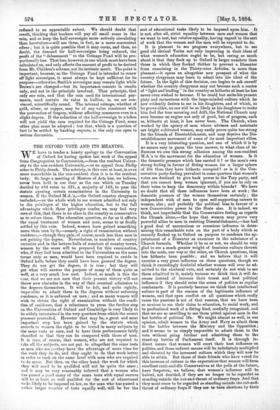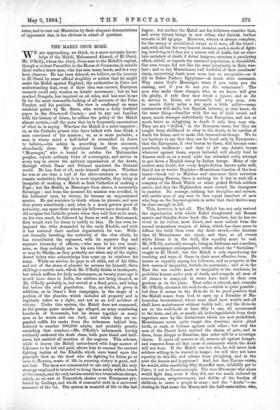THE OXFORD VOTE AND ITS MEANING.
NvE have to tender a hearty apology to the Convocation of Oxford for having spoken last week of the appeal from Congregation to Convocation,—from the resident Univer- sity to the non-resident University,—as an appeal from Philip sober to Philip drunk. The sobriety, in this case at least, is even more remarkable in the non-resident than it is in the resident body. So large a meeting of Masters of Arts has, we believe, never been held in our time -as the one which on Tuesday decided by 464 votes to 321, a majority of 143, to pass the statute opening certain examinations in the University to women. If the Oxford M.A.'s,—the Oxford country clergymen included,—on the whole wish to see women admitted not only to the privileges of the higher education, but to the full advantages which these 'privileges confer, we may feel very sure of this, that there is no class in the country so conservative as to refuse them. The education question, so far as it affects the equal treatment of women and men, seems to us finally settled by this vote. Indeed, women have gained something more than men by it,----namely, a right of examination without residence,—though they gain, of course, much less than men in not gaining the degree. Nevertheless, in numbers of country rectories and in the lecture-halls of numbers of country towns. women by the score will be prepared for this examination, who, if they had been admitted to the Universities on the same terms only as men, would have been required to reside in Oxford halls before they could have been granted the degree. They do not get the degree, it is true ; but they will get what will answer the purpose of many of them quite as well, at a very much less cost. Indeed, so much is this the case, that we are not sure that their present victory will not throw new obstacles in the way of their eventual admission to the degrees themselves. It will be felt, and quite rightly, impo-sible to admit them to the degrees without enforcing residence, as it is enforced on men ; and so many women will wish to obtain the right of examination without the condi- timi of residence, that a reluctance to press the further step on the Universities of Oxford and Cambridge is very likely to be widely entertained in the very quarters from which the recent pressure proceeded. However that may be, a great and most important step has been gained by the statute which accords to women the right to be tested in many subjects by the same tests as men, and to have their performances fairly classified so that they can be compared with those of men. It is true, of course, that women, who are not required to take all the subjects, are not put to altogether the same tests as men who are ;—they have the advantage of more time for the work they do do, and they ought to do that work better in order to rank on the same level with men who are required to do more. But then, on the other hand, the work for which they will need to be qualified will not be quite the same ; and it may be very reasonably inferred that a woman who has passed a good many of the same tests with equal success will be at least as well qualified for the sort of educational task' likely to be imposed on her, as the man who has passed a rather larger number of tests equally well, will be for the
sort of educational tasks likely to be imposed upon him. It is not, after all, strict equality between men and women that we want to test, but relative equality, having regard to the sort of work that the women and the men will be expected to do.
It is pleasant to see progress everywhere, but to see good old clerical Tories not only improving in their ideas of what women's education ought to be, but caring so much about it that they flock up to Oxford in larger numbers than those in which they flocked thither to prevent a Dissenter from examining in the Thirty-nine Articles, is more than pleasant—it opens an altogether new prospect of what the country clergyman may learn to admit into his ideal of the future. In the light of this decision, one begins to ask oneself whether the country clergyman may not become such a centre of "light and leading" in the country as hitherto at least he has never even wished to become. If he could but unite his present piety and earnestness with the large-minded culture which he now evidently desires to see in his daughters, and of which, as he grows older, no one will be so likely as his daughters to make him feel the true meaning and drift, the National Church may soon become an engine not only of good, but of progress, such as, hitherto at least, it has never been. The Church, when worked by the agency of men whose advisers and assistants are bright cultivated women, may easily prove quite too strong for the friends of Disestablishment, and may deprive the Dis- establishment movement of some of its most important allies.
It is a very interesting question, and one of which it is by no means easy to guess the true answer, to what class of in- fluences we owe this strong adhesion among the non-resident M.A.'s to the movement for the education of women. Is it the domestic pressure which has carried it ? or the men's own strong feeling in favour of fitting women for a larger sphere of life than they have hitherto occupied ? or is it the Con- servative party-feeling prevalent in some quarters that women's votes are destined to give back power to the Tory party, and that you cannot keep women ignorant, if you are to rely on their votes to keep the democracy within bounds? We have no doubt that all these influences have been at work ; the domestic pressure of the women themselves certainly ; the independent wish of men to open self-supporting careers to women, also ; and probably the political bias in favour of a new Conservative power in the State also. It is indeed, we think, not improbable that the Conservative feeling as regards the Church alone,—the hope that women may prove very powerful allies to men in resisting Disestablishment,—has had a good deal of unconscious or conscious influence in deter- mining this remarkable vote on the part of a body which so recently flocked up to Oxford on purpose to condemn the ap- pointment of a Dissenter as examiner in the substance of a Church formula. Whether it be so or not, we should be very glad to see a much greater weight of feminine culture thrown into the scale, one way or the other, on Church questions, than has hitherto been possible ; and we believe that it will exercise a very great influence on those questions, though we think it exceedingly doubtful whether women will ever be ad- mitted to the electoral vote, and certainly do not wish to see them admitted to it, mainly because we think that it will de- crease instead of increase their truest and best• political influence if they should enter the arena of politics as regular combatants. It is precisely because we think that intellectual culture is part of the essence of the legitimate influence of women, and that open conflict on all questions which really rouse the passions is not of that essence, that we have been so anxious to see their claim to education, to social work, and to professional work of a fitting kind, cordially recognised, and that we are so unwilling to see them pitted against men in the hot battles of political life. We might almost as well, in our opinion, admit women to the Army and Navy as admit them to the battles between the Ministry and the Opposition ; and it seems to us simply impossible to admit them to the vote without going further and admitting them to the stand-up battles of Parliament itself. It is through in- direct means that women will exert their best influence on politics, and those indirect means will be indefinitely multiplied and elevated by the increased culture which they will now be able to attain. But those of their friends who have voted for this increase of culture in the expectation that women will form excellent rank-and-file Conservatives at the polls of the future, have forgotten, we believe, that women's influence will be halved, not doubled, if they are no longer to be regarded as standing outside the cut-and-thrust of ordinary frays. And that they must cease to be regarded as standing outside the cut-and- thrust of ordinary frays if they are to tarn elections by their votes, and to cast out Ministries by their eloquent denunciations of opponents' sins, is too obvious to admit of question.



































 Previous page
Previous page